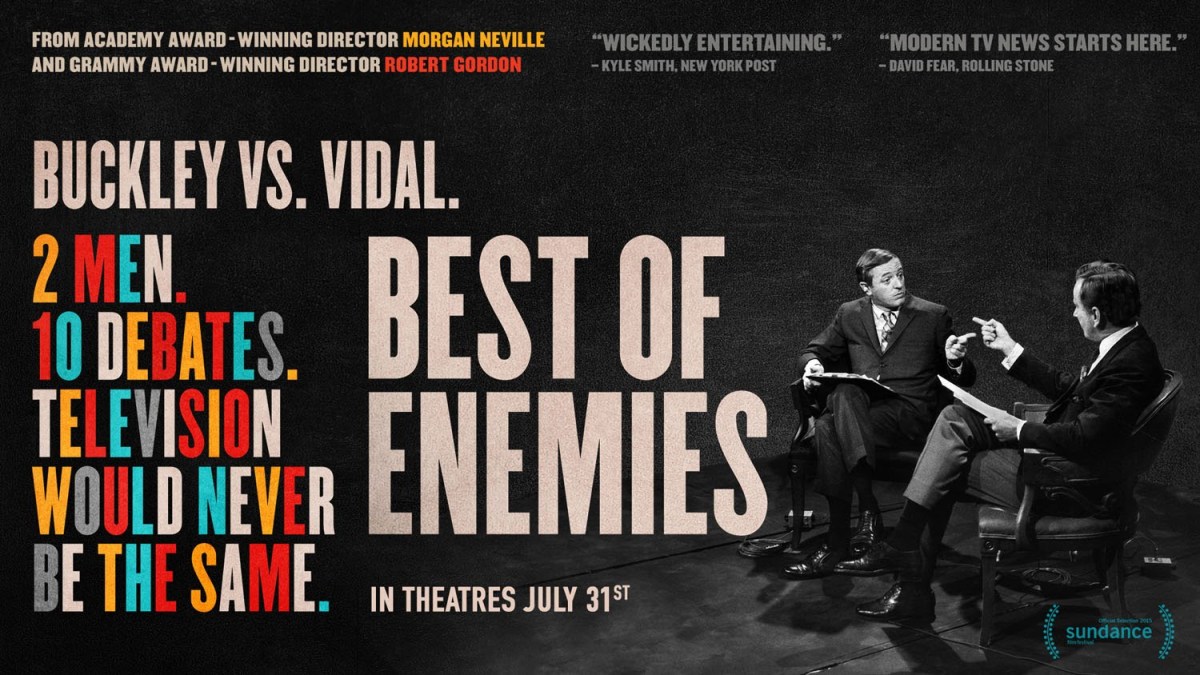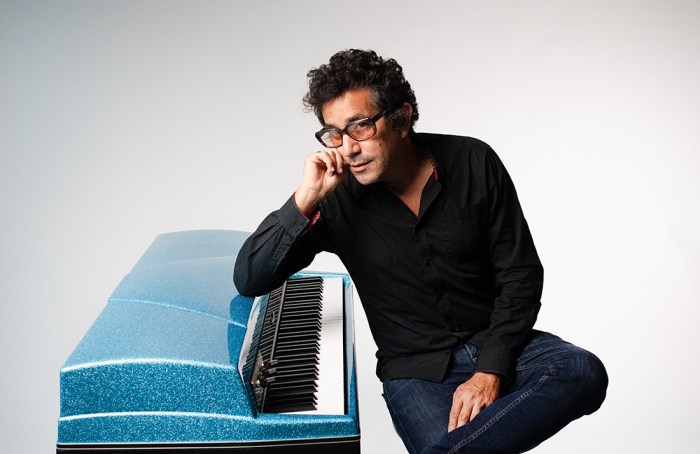As we plunge headfirst into election season, kicked off Thursday night with the raucous Republican debate at the Quicken Loans Arena in Cleveland, Ohio, it’s interesting to consider just how we got here. The world of political punditry is diametrically divided into two distinct camps: right and left. The news comes at us through either filter, shaded by not only a shadow of subjectivity, but replete with disdain for all who share a different perspective. [See: Donald Trump.]
But it wasn’t always this way.
The documentary Best of Enemies—written and co-directed by Robert Gordon and Morgan Neville, who won last year’s documentary Oscar for Twenty Feet From Stardom—traces the genesis of the faux debates that operate as standard political punditry to the year 1968, when then-faltering network ABC took a gamble during the Republican and Democratic presidential conventions by changing their coverage to hosting live debates between Gore Vidal and William F. Buckley, Jr.
At the time, both Buckley and Vidal were the voices of the intellectual elite, their syntax indicative of their American aristocratic upbringings. However, despite their similar social and economic standings, they represented ideologically opposing sides: Vidal, a noted historian, novelist, and playwright, was a voice of the progressive left. He loudly opposed American expansionism and supported the Civil Rights Movement, which was coming to an explosive head at the time. Vidal had famously purported that “we are all bisexual to begin with,” and he sought to dismantle what he believed were the social constructs making homosexuality seem immoral, unnatural or criminal.
Buckley stood in direct opposition to Vidal on almost every important issue of the time. As the founder of the conservative movement and the editor in chief of the National Review, Buckley took positions that supported white supremacy in the South during the early Fifties, later distancing himself when the movement grew violent. His devout Catholicism formed the foundation of many of his positions, and informed the moral authority he believed government should operate from. His economic and foreign policy opinions veered drastically from Vidal’s, and, through decades of television appearances on his TV talk show Firing Line and his editorship of the National Review—where he stayed until 1990—helped give shape to the modern idea of American conservatism. He was often credited with paving the pathway to Ronald Reagan’s presidency.
These opposing ideals wouldn’t have amounted to much television drama, however, if it wasn’t for the uniquely combative debating style they both employed—and for the personal disdain with which they held each other and nearly everything their opponents represented.
While Buckley arrived on set for the first debate in Miami Beach during the GOP convention to discuss issues pertinent to the presidential race at the time, Best of Enemies shows that Vidal came with two goals in mind: to personally crush Buckley by inciting him enough to expose himself, and to use the national stage in order to bring greater attention to his novel Myra Breckenridge (and in doing so, boost book sales).
He accomplished both.
Vidal came armed with an encyclopedic amount of knowledge about Buckley, his family, and the positions he’d taken in the National Review (including inaccurate stories and editorials based on false premises, according to veteran TV journalist George Merlis, who wrote a blog about the significance of the infamous debate). Buckley came to the set only with his innate intelligence and ample oratory skills.
They weren’t enough.
Vidal came out swinging, first asking how the party so inextricably intertwined with “Republican greed” could lead the country. The clearly flustered Buckley put his rhetorical prowess to good use, dismantling Vidal’s arguments and accusations as skillfully as possible. The “debates” quickly degenerated into personal and ideological attacks that grew more heated as mudslinging substituted for discussion of national policy and political discourse.
Vidal succeeded in two distinct ways: in creating an avenue for marketing for his book—Buckley continued to refer to Myra Breckenridge as a pornographic and immoral work (while Vidal refused to acknowledge the National Review by name)—and in the ninth debate that served as the culmination of the growing animosity between the two, which exploded into Buckley’s striking loss of temper that Vidal regarded as the ultimate exposure of him as “cuckoo.”
Vidal’s victory came in Buckley’s outburst of a gay slur and threat of physical violence against him. After Vidal called him a “crypto-Nazi” (the film shows that he’d meant to say “crypto-Fascist”), Buckley lost control of his carefully wrought image.
“Now listen, you queer, stop calling me a crypto-Nazi or I’ll sock you in the goddamn face,” he said, half-rising from his seat. “And you’ll stay plastered.”
Christopher Buckley, William F.’s son and brief editor in chief successor of the National Review, once wrote that it was only due to his father’s collarbone injury at the time that Vidal remained physically unscathed in that moment.
“During the Chicago debates, he was wearing a clavicle brace,” says Christopher Buckley. “It’s possible that the brace prevented the moment from being truly iconic.”
Yet the damage was done. Both Buckley and Vidal knew it.
“That was a disaster,” Buckley said as soon as the cameras stopped rolling.
“We gave them their money’s worth tonight,” Vidal responded.
In their own way, each drew from this exchange for the rest of their lives. Buckley, unable to let it go, penned a 12,000-word defense of his performance in Esquire titled “On Experiencing Gore Vidal” in August 1969. Vidal’s acerbic response in the same magazine earned him a libel suit put forth by Buckley that stretched years into their lives, further fueling the lifelong shared enmity that haunted and inspired them until their respective deaths.
Their legacy is the ugliness played out on national television, disguised as reasonable political discourse.
Best of Enemies was recently featured at the 2015 Stony Brook Film Festival and is currently playing at Lincoln Plaza Cinemas in Manhattan. Check out lincolnplazacinema.com for showtimes.





























